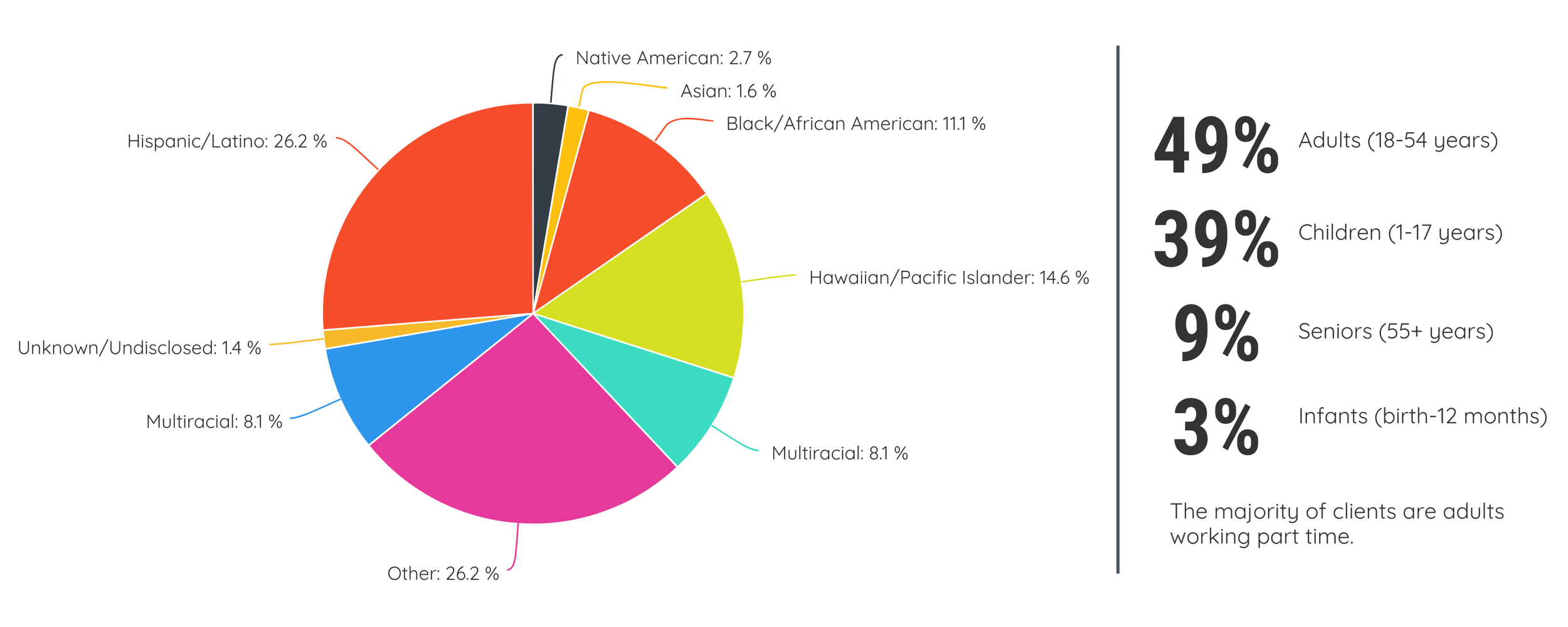
Our Story
History of The Auburn Food Bank
In 1930 a family was burned out of their home and neighbors gathered what would be needed to help them restart. At the end of this "project" there was enough left over to help more families thus the – Auburn Community Chest – was formed.
The Auburn Community Chest was housed in private homes, fully operated by volunteer staff.
1950 – We became a member of United Way – which increased our ability for financial support and it helped to organize our program
1970 – first volunteer DIRECTOR began
1980 – Began partnership with King County Housing Authority,(KCHA), which gave us a place to have an office for no cost. With more room – a clothing bank was begun. The building was also shared with the KCHA maintenance department for Burnadale Homes (our building is what used to be the Recreation Center for Burndale Homes) The food bank occupied two thirds of the south end of the facility. Maintenance was housed in the “garage”. It was here that they stored all of the lawn equipment for this site.
George Osborne and Ivan Rosenberry were the individuals responsible for the food bank having extra storage space at Burndale Homes.
George Osborne noticed that the food bank was in dire need for more storage space. Therefor he and Ivan Rosenberry spoke to the South Area Manager for King County Housing Authorities, Patricia Hogaboam, about the possibilities of the food bank absorbing part of the old garage space at the north end of building. She fully supported the notion and shortly thereafter the food bank had over half of the garage space as well. Housing built an additional wall that separated the maintenance department from the food that was stored in the garage.
In another effort to improve the program, a Director was hired and two paid staff were brought on – which increased the effectiveness of the agency.
1983 – we were added to the Boeing Employees Good Neighbor list – where employees could choose to have funds taken from their check and sent directly to the AFB – this allowed us to purchase a van for the food bank – replacing the need to have the volunteers use their own vehicles – which were usually small – to make the day to day pickup of food.
A mobile home was purchased for emergency transitional housing.
1990 – the clothing bank and the mobile home for transitional housing were given to other organizations who were more equipped to handle these programs and in 1994 the Auburn Community Chest became the Auburn Food Bank – focusing on providing food.
At this point, our Board became more of an “administrative board” rather than a total “hands on” board. This is also when the “Harvest Breakfast” began – our largest “hands on” fundraiser – which has been held annually ever since, and is known as “the” breakfast of the year! Our first year 400 attended with $20,000 being raised and each year is bigger than the last!
1994 – Jack Laverty became the first staff Executive Director.
In 1996, the Auburn Food Bank took the Community Super program under it’s wing and leadership. The Community Super is under the leadership of Elaine Prenovost and a totally volunteer crew that begin by gathering food on Sunday from the local grocery stores, setting up the room on Monday morning and preparing the food throughout the day. The program will feed up to 100 people on any given Monday --- from the homeless to the elderly who may otherwise not get a hot meal any other day of the week.
April 2006 - Debbie Christian became the Executive Director.
July 2006 - Past President Bill Kyle brought an idea to Debbie. Could The Auburn Food Bank feed hungry kids on the weekends?
“Food to Go" was initiated by the past president of the Auburn Food Bank, Bill Kyle, who learned of a similar program run by Communities In Schools of Tarrant County, Texas. ”A lot of kids rely on school meals to meet a part of their nutritional needs. But for some kids school meals are their primary source of food. It’s tragic that there are children in Auburn who actually go hungry over the weekends and on holidays," said Mr. Kyle. "How can a child learn, or even concentrate, if they're starving?"
After looking at the Texas program Mr. Kyle contacted the Auburn Food Bank who agreed to supply the food and who then looked to Communities In Schools of Auburn to coordinate the effort. CIS Auburn, provided backpacks donated by the Costco Wholesale Backpack Program and is working with counselors to ensure those students most in need are identified. As part of a service learning project, students at Auburn's Mountainview High School gather the food items and assemble the backpacks each week.
2008 a second evening meal program is started at NW Family Church with Pastor Warren Bullock. This meal is targeting families in the area and is open each Wednesday evening.
Our work today is the same that the citizens of Auburn set out to do in 1930 – some 80 years ago…we are an agency that provides over 2.1 million in services (food and monetary assistance for energy bills) to those in need.
Through United Way – we have found ways to measure our success through surveys and questionnaires and goal setting.
We work in conjunction with:
South King County Food Bank Coalition
The King County Food Bank Coalition
Washington State Food Coalition
The Anti Hunger Nutrition Coalition
South King County Human Services Coalition
Executive Alliance
King County Housing Authority
United Way
Who We Serve
Approximately 140 families are served each day…
We provide instructions in all of the necessary languages of people we serve.
How can you help? You can be that neighbor on the other side of the fence who finds a need and fills it.

